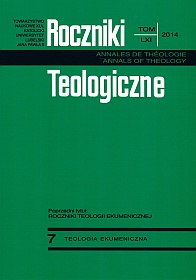Church Language at the Service of Gender Justice: The Example of the Lutheran Churches in the United States (ELCA) and Canada (ELCIC)
Abstract
This article is aimed at presenting a certain limited and at the same time significant area on which such cultural and political pressure is exerted, i.e. the Churches’ language policies. The issue of language policy, which is seen as a symbol of actions undertaken for the sake of gender equality in church life, will be presented based on the example of the Lutheran Churches. This is because it is Lutherans who, in recent years, have been the most committed to promoting equality between, and equal rights for, women and men (especially in North America) in social, economic and political life as well as within the Church’s structures. The article begins with a presentation of the issue of gender justice in modern mainstream Lutheranism. Then the role of church language for this trend in the Church is shown as a tool in the fight for gender justice and for eliminating inequalities as well as negative stereotypes. Next, the official recommendations of the largest Lutheran Churches in North America are presented concerning the purification of church language and containing guidelines on its proper, non-discriminatory use. Finally, an attempt is made at presenting the results of Lutheran language policy.
References
Barger, T.K. “Bishop Eaton stands for inclusion. Ohioan takes reins of the Evangelical Lutheran Church in America.” http://www.toledoblade.com/Religion/2014/02/01/Bishop-Eaton-stands-for-inclusion.html [27.02.2014].
“Community life.” http://www.tlsohio.edu/life-at-trinity/community-life [27.02.2014].
“ELCA Seminarians Not Allowed to Call God "Father".” http://www.exposingtheelca.com/1/post/2010/08/elca-seminarians-not-allowed-to-call-god-father.html [27.02.2014].
“ELCIC Office for Communication, Guidelines for Inclusive Language for writers, editors, and speakers.” http://elcic.ca/Resources/Inclusive-Language.cfm [27.02.2014].
Grzywacz, Małgorzata. “Konsekwencje pewnego przekładu. Niemieckojęzyczna translacja Biblii na ‘język sprawiedliwy.’ Jej geneza oraz duszpasterskie implikacje.” In Protestancka kultura słowa, edited by Zbigniew Pasek, 50-57. Kraków: Nomos, 2009.
“Inclusive Language.” http://www.plu.edu/provost/Faculty-Governance/november-11-2011-inclusive-language-attachment-c-corrected.pdf [27.02.2014].
Johnson, Elizabeth A. “Imaging God, Embodying Christ: Women as a Sign of the Times.” In The Church Women Want. Catholic Women in Dialogue, edited by Elizabeth A. Johnson, 45-59. New York: The Crossroad Publishing Company, 2002.
Składanowski, Marcin. “From Jesus Christ to ‘green issues.’ Development or degeneration of the ecumenical movement?” Roczniki Teologii Ekumenicznej 4 (2012): 163-177.
Składanowski, Marcin. “Podstawowe aspekty chrystologii feministycznej.” Studia Teologiczne. Białystok, Drohiczyn, Łomża 31 (2013): 65-80.
Składanowski, Marcin. “Polityka sprawiedliwości genderowej Światowej Rady Kościołów.” In O ekumenizmie w Roku Wiary. Księga pamiątkowa z okazji jubileuszu 30-lecia Instytutu Ekumenicznego KUL, edited by Przemysław Kantyka, Piotr Kopiec, and Marcin Składanowski, 203-215. Lublin: Wydawnictwo KUL, 2013.
“Strategies for Inclusive Communication. Pointers for Positive Interactions.” http://www.plu.edu/dss/widgets/documents-forms/items/resources-for-faculty/Strategies-for-Inclusive-Communication.doc [27.02.2014].
Gender Justice Policy, edited by The Lutheran World Federation. Geneva: LWF, 2013.
“Use of Inclusive Language at Trinity Lutheran Seminary.” http://www.tlsohio.edu/academics/internship/all-downloads/item/use-of-inclusive-language [27.02.2014].
“Worship of "Goddess" in the ELCA and Led by Synod Council Leader.” http://www.exposingtheelca.com/1/post/2010/05/worship-of-goddess-in-the-elca-and-lead-by-synod-council-leader.html [27.02.2014].
Copyright (c) 2014 Roczniki Teologiczne

This work is licensed under a Creative Commons Attribution-NonCommercial-NoDerivatives 4.0 International License.





